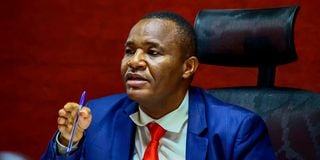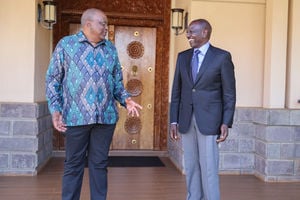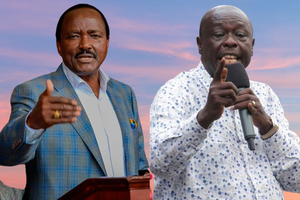
Justice Lawrence Mugambi.
The High Court has nullified the Independent Electoral and Boundaries Commission (IEBC) (Amendment) Act of 2023, which established the electoral body’s selection panel.
Justice Lawrence Mugambi nullified the IEBC (Amendment) Act No. 1 of 2023 terming it unconstitutional as it was passed without considering views presented by the public and various stakeholders.
However, Parliament said in a statement that the decision had no effect since the 2023 Act has since been amended by IEBC (Amendment) Act, 2024, which was assented to law by President William Ruto in July this year.
“While the Petition was pending before the High Court, the Independent Electoral and Boundaries Commission Act was amended in 2024 to give effect to the recommendations of NADCO on the composition of the IEBC Selection Panel,” Parliament said in a statement.
It went on: “Today’s judgment by the High Court has no effect on the composition of the Selection Panel for the Recruitment of Chairperson and Commissioners of the IEBC.”
In the judgment, Justice Mugambi noted that the Bill was withdrawn by the chairman of the Senate Legal Affairs and Human Rights Committee on the floor of the House, without the consent of the members.
Justice Mugambi said the Senate proceeded to deliberate on the Bill in its original form excluding the report that had amendments that were informed by the public participation exercise.
“In the circumstances, I find that the processing of the Bill in the Senate violated Articles 118 (1) (b) and 10(2) (a) of the Constitution hence the ensuing Independent Electoral and Boundaries Commission (Amendment) Act No. 1 of 2023 is unconstitutional null and void,” said the judge.
Nadco, and in effect the 2024 amendment President Ruto assented to, expanded the panel from seven to nine and reorganised the representatives to the selection panel.
The earlier panel had seven members made up of two persons - a man and a woman - from the Parliamentary Service Commission; one person each nominated by the Public Service Commission, the Political Parties Liaison Committee, and the Law Society of Kenya and two other people nominated by the Inter-Religious Council of Kenya.
Parliament had then nominated Mr Bethuel Sugut and Ms Novince Euralia Atieno, while PSC submitted the name of Charity Kisotu.
Political parties’ liaison committee picked Mr Evans Misati, LSK picked Mr Benson Ngugi while Dr Nelson Makanda and Ms Fatuma Saman were nominated by the Inter-Religious Council of Kenya.
In his decision, Justice Mugambi said the withdrawal by the chairman on January 19, 2023, meant that the Bill reverted to its prior state and was passed without considering the public participation input.
The judge added that “the logical inference from the conduct of the Senate is that the public participation it conducted was meaningless and majorly cosmetic”.
Busia senator Okiya Omtatah submitted that when it came time for the House to vote in the afternoon, the Chairman of the Committee withdrew the Report that contained the amendments.
He said since it is at the Committee stage that the Bill was subjected to public participation, the effect of the impugned “withdrawal” of the Report was that the Bill was passed in violation of the express requirements of Articles 10 and 118 of the Constitution without subjecting it to public participation.
Parliament had opposed the case arguing that the panel has strict timelines and a further delay in the recruitment of the chairperson and members of the IEBC will affect the review of names and boundaries of constituencies.
The clerk of the Senate Mr Jeremiah Nyegenye had pleaded with the court saying it would not be in the public interest to suspend the operations of the selection panel.
Mr Nyegenye also submitted that the procedure used by the Committee chairperson for the withdrawal of the amendments was done in consultation with the committee members and in accordance with Senate Standing Order 152 (6).
He further argued that adequate public participation does not necessarily mean that the legislature should incorporate in the Bill all the submitted proposals and views.
In reply, Mr Omtatah said the amendment was actuated by mischief and is intended to undermine the independence of IEBC.
He submitted that the Public Service Commission- was better suited to the task of selecting the chairperson and commissioners of IEBC.
On his part, the Attorney General had asked the court to dismiss the case arguing that it has no merit and should be dismissed since Article 110(5) of the Constitution contemplates that a bill concerning counties may originate from either house of Parliament and both houses may pass the bill in the same form.
The judge said Parliament failed to “come out clean” about what became of the public views that had been gathered and had informed the Senate’s Committee report in making recommendations for amendments after the report was withdrawn without being debated.
Justice Mugambi said although Parliament has legislative authority under Article 94 (1) and must be allowed to do its work without undue interference from the Judiciary, the immunity is lost if it is demonstrated that it violated the constitution as Article 3 obligates all persons to respect, protect and uphold the Constitution.
“The fact that the Bill could have undergone public participation in the National Assembly cannot absolve the Senate, which is constitutionally independent of National Assembly, from appraising itself of the issues of concern to the people as far as this legislation it intended to pass is concerned,” he said.
The judge added that conducting public participation and discarding the report without deliberating on the same shows that no appropriate consideration was given to the public views by the Senate.









